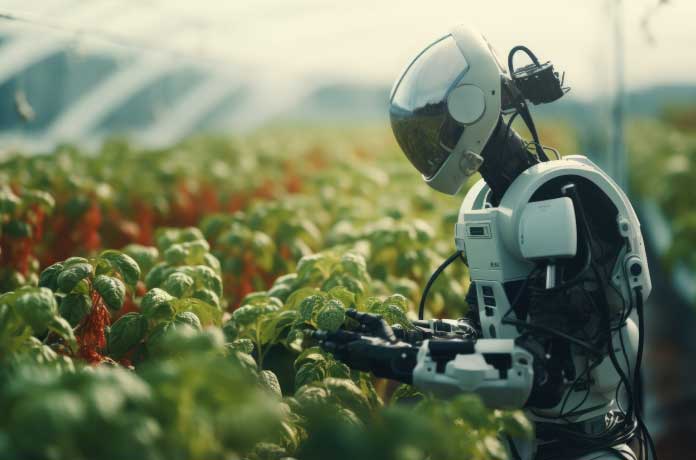One of the oldest and most crucial sectors, agriculture, has consistently evolved with the advent of new technologies, from motorized equipment to biotechnology. According to research, the global population is growing by leaps and bounds and is forecasted to reach 9 billion by 2050. With this rise in population, the agriculture industry is all set to boost efficiency by approximately 70 percent by leveraging the latest technologies like AI (Artificial Intelligence) and ML (Machine Learning). The applications and benefits of these technologies in agriculture are highlighted below:
Precision Agriculture with Predictive Analytics
Precision agriculture, a management approach, leverages AI systems to improve crop quality and accuracy. It deploys AI technology to help detect pests, plant diseases, and deficiencies in plant nutrition. Herbicide overuse and resistance decrease by using AI sensors to detect and target weeds and determine which herbicides to apply within designated buffers.
Farmers are using AI to make farming more precise by creating models that forecast seasons. These models can look ahead by months using collected data to give basic predictions about the best crops and when and where to plant them. AI systems help run farms better by making choices based on weather patterns.
Identifying Species
Several plants have leaves that look alike, with similar colors and shapes, which makes it hard to identify just by looking. Machine learning can study complex patterns to identify related plants and weeds, which saves farmers time and helps them focus on other crucial work.
Animal Herding
Robots are used to spot weeds and damaged plants and round up farm animals and sheep. These ML-powered devices can transport heavy goods and collaborate with drones to relay essential information to farmers.
Breeding Farm Animals
Picking which animals to breed uses gene information to enhance pregnancy cycles and boost good traits like better milk, fighting off sickness, and having babies. While selective breeding is not new, ML-enabled sensors and apps now let farmers look at information on genes, markers in cells’ surroundings, what animals eat when babies are born, and more. This information helps ranchers make informed choices about which animals to mate.
Predicting Prices
Knowing the production rate of quality crops helps big farms, groups of farmers, and regular farmers get better prices while selling their crops. Assessing overall demand for a particular crop to determine its price elasticity informs pricing strategies. In case of lost revenue, this information alone saves farming companies millions of dollars annually.
AI helps farmers automate their farming practices while shifting towards precision cultivation for increased crop output and quality using limited resources. Companies developing AI-based products or services, such as training data for agriculture, drones, and automated machinery, will benefit from technological advancements, addressing food production challenges for a growing population.




